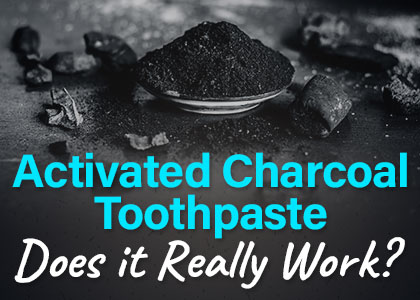Activated Charcoal Toothpaste: Does It Really Work?
 I See a Toothbrush & I Want to Paint It, Black
I See a Toothbrush & I Want to Paint It, Black
You’ve probably seen some ads, videos, or articles online about activated charcoal toothpaste, accompanied by people brushing with black mouths—to whiten their teeth? Sounds counterintuitive, right? The Spring dentists of Spring Creek Dentistry want to share some information on a trend you may be curious about: activated charcoal as a teeth whitening, breath freshening toothpaste.
In fact, activated charcoal is a multi-purpose ingredient found in an increasing number of products seemingly every day, and is used in many potentially unexpected ways, including:
- Gas and bloating alleviation
- Treatment of alcohol poisoning and hangover prevention
- Emergency toxin removal
- Mold cleansing
- Water filtration
- High cholesterol reduction
- Rash and/or acne treatment
One of These Things is Not Like the Other
Are you surprised we didn’t mention backyard grilling? Charcoal and activated charcoal may share a name and some materials in common, but the similarities end there. Charcoal briquettes are a toxic substance not meant for human consumption. The production processes and the way they interact with other molecules is very different, so we advise our friends and neighbors to use charcoal briquettes only for burgers, hot dogs, steaks, chicken, vegetables—whatever you fancy—just don’t eat it or scrub your teeth with it.
How Does Activated Charcoal Work?
Activated charcoal’s detoxifying power works through a process called adsorption. Instead of absorbing toxins and chemicals and helping them assimilate into the bloodstream, activated charcoal causes elements to bind to its millions of tiny pores for removal through waste, or in this case: spitting. When using it as a toothpaste or powder, its pores will bind to surface stains, plaque, and food particles for easier removal. Combined with its darkness, charcoal toothpaste may make your teeth appear whiter, whether by contrast or the regular cleaning and stain-removal process.
Does That Mean It’s Ineffective?
Not necessarily. Activated charcoal is quite abrasive and therefore works to remove surface-level stains that can be caused by coffee, red wine, tobacco, and colorful foods (think of delicious curries containing turmeric). However, if you have stains that are intrinsic (within the tooth) instead of extrinsic, whether they’re the result of trauma, weak enamel, medications, or overuse of fluoride, you’ll still get the most benefit from a professional whitening treatment.
Contraindications
That’s a fancy word that means: “Don’t use this if…” While activated charcoal is probably going to be harmless for you to try as a toothpaste, Spring Creek Dentistry recommends taking it slow and easy. Evaluate your brushing technique and be ready to clean your sink, countertop, and surrounding areas when you use an activated charcoal product. For additional protection, avoid wearing your favorite pieces of clothing, because this stuff can stain like nobody’s business—don’t worry, it will not stain your natural teeth.
Consult with your Spring dentists if you have dental restorations like crowns, veneers, or tooth-colored fillings—unfortunately, these materials do run the risk of being stained by the activated charcoal. If you experience sensitivity, we recommend using it no more than once a week, if at all.
How to Proceed
We want our friends and neighbors to exercise caution and make the best decisions for their oral and overall health. If you find that activated charcoal makes your mouth look and feel its best, we’re here to support you. However, if it appears to be weakening your enamel or causing your gums to recede, we’ll let you know at your exams and work with you to prevent further damage.
Additionally, if you have tried activated charcoal or other at-home methods of teeth whitening but still feel like your smile could use a boost, we can customize a professional whitening treatment just for you. Contact us to schedule an appointment today!
The content on this blog is not intended to be a substitute for professional medical advice, diagnosis, or treatment. Always seek the advice of qualified health providers with questions you may have regarding medical conditions.
